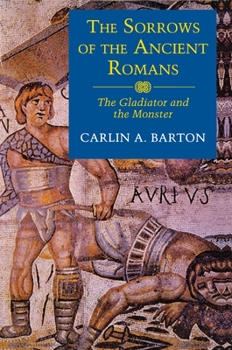The Sorrows of the Ancient Romans: The Gladiator and the Monster
Select Format
Select Condition 
Book Overview
This inquiry into the collective psychology of the ancient Romans speaks not about military conquest, sober law, and practical politics, but about extremes of despair, desire, and envy. Carlin Barton... This description may be from another edition of this product.
Format:Hardcover
Language:English
ISBN:069105696X
ISBN13:9780691056968
Release Date:January 1993
Publisher:Princeton University Press
Length:224 Pages
Weight:1.05 lbs.
Dimensions:0.9" x 7.8" x 10.0"
Customer Reviews
3 ratings
Essential reading for Ancient Roman History readers
Published by Thriftbooks.com User , 15 years ago
In my never-ending search for the perfect Roman History historical novel, I was referred to this textbook. Please understand that it truly a TEXTBOOK stuffed with references from ancient Greece to hip-hop 'playing the dozens'. When one of your friends asks why you read 'all that Roman stuff' you might want to inform them that what we moderns do, how we behave, how we enjoy sports, all traces somewhat back to the Classic era. Carlin A. Barton takes a shotgun approach to 'eewww, why would the Romans have people fight to the death in front of 55,000 people'? ... and 'eewww, why would the Romans slaughter giraffes, Christians, prisoners, and the occasional lion on their public holidays'? Good questions, ...but your friends don't want to know the answer because they judge the ancients based on their own mores which rely on their television, sports, and movie-going experiences. This book is very important. It is a psychological assessment of the 'ancients' based on THEIR values, not ours. If you don't understand this review just flip through the 99 channels offered to you on cable TV. Count how many channels offer the scenario of someone facing 'another' (often with a gun), who want to kill the star. There. Think. Imagine. (see all my reviews)
Hard to Forget
Published by Thriftbooks.com User , 15 years ago
I read this book about ten years ago when I was a graduate student completing a PhD in Classics. Although I've since left the field, it's one of the few books I've never been able to part with--or to forget. As a classicist, your subjects are removed from you in just about every conceivable way (temporally, spatially [at least for us American scholars], culturally, linguistically). Barton's book was the first I ever felt helped me bridge that gap in a meaningful way. It gave me a whole new perspective on the rest of my academic pursuits and, in some ways, a license to think in an entirely different way about primary sources.
Very Odd and Very Interesting
Published by Thriftbooks.com User , 17 years ago
TV Guide used to rate the moveis which were on television that week, and I once came across an issue which gave the movie "Batman Returns" three stars and the Charleton Heston version of Shakespeare's "Julius Caesar" two stars. Even granting that the production values of the former were far superior to the latter, it is hard to imagine that a great "Batman" was superior to a mediocre "Caesar." "The Sorrows of the Ancient Romans" is a better book than "God is Not Great" and in that spirit, I give it five stars. Barton is a wonderfully learned, somewhat scatter-shot writer who has a first-rate command of the Latin sources (including very obscure Latin sources). On the one hand, the sheer originality and freshness of Barton's pronouncesments on Roman civilization inspire awe. On the other hand, here inability to let any idea which pops into her head escape the printed page invites chaos. She moves deftly (or randomly) from Latin incriptions, pop music lyrics, World War II analogies, Biblical literature, and French sociological and philosophical tracts. Good as this book is, one suspects Barton is better at article length. In essence, this book involves a consideration of some of the darker aspects of the pagan Roman psyche (one wonders, after reading this book, whether that psyche had any lighter elements). Focusing on Roman fascination with gladiators and monsters in the late-Republican, early Imperial period, Barton makes a powerful case for the proposition that the Romans had a love of -- even a need for -- debasement, particularly the vicarious debasement of those like themselves. Thus, gladiators were at once the most despised and expendible element of Roman society and among the most admired. Barton locates this collective sadism in the Roman need to expiate their anxieties in the sorrows of others. She occasionally hints also at something more plausible -- that the pagan Romans were violent thugs, and that watching those who were victims of their thuggery show submission and honor to the thuggish Roman worldview tended to validate that worldview in the mind of the spectators. At times, one is led to the suspicion that Barton has come to like her disgusting subjects all too much -- somewhat like a veteran criminal lawyer who starts to feel sympathy for his questionable clientelle. Of course, Barton also has a way of stepping back from her empathies to remind the reader occasionally that feeding people to animals or burning them as living torches is not altogether admirable behavior. It is impossible to come away from this book unchanged, however. The world Barton presents is at once so alien that it is hard to grasp the psychologal processes behind it, and so familiar that we may make kick-boxing into an olympic sport. The book is, almost literally, a mind-bending experience and anyone who wants to reflect on some of the realities of ancient history would do well to read this book.




